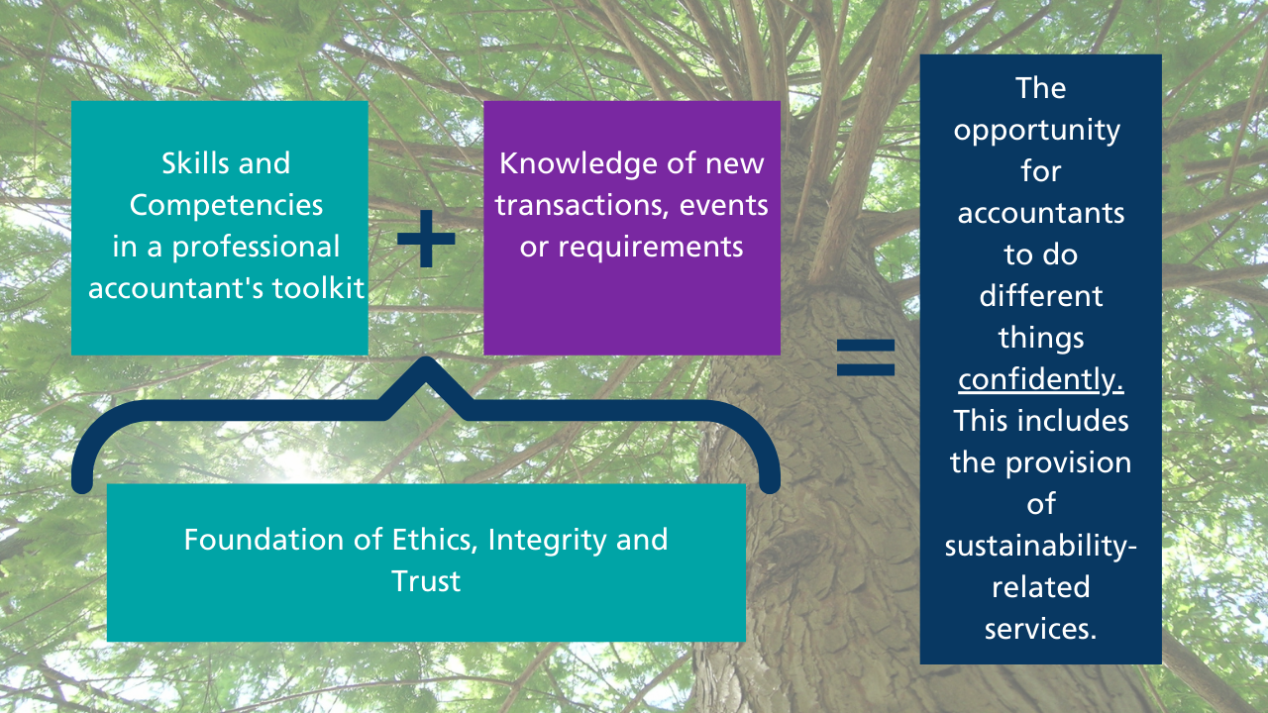Professional accountant’s historical role has been substantially founded in financial accounting and reporting. We have been asked to consider the financial ramifications of contracts and standards, prepare valuations and estimates to include in financial statements, develop entries to record monthly costs, produce and audit interim and annual financial statements and reports—to name a few. These are skills and competencies that we learn both in our initial training and development and as we continue to advance in our careers.
As professional accountants, we also have a drive to pursue knowledge when faced with a new transaction or event, which gives us the confidence to broaden the processes, transactions, and reporting that can be applied to other areas. This drive to learn and the related skills and competencies we already have are also necessary for developing the processes to produce sustainability related information and disclosures, which are becoming increasingly relevant and necessary for organizations.
Delving into this non-financial reporting area is an example of our call to action to reimagine the role of the future accountant issued in early 2020 and the opportunities that are available to professional accountants and our profession.
Many of the skills and competencies required to effectively use sustainability standards and frameworks are already in today’s professional accountant’s toolkit. Our background and experience with financial and, frequently, non-financial reporting means we already know how to:
- Understand and report information that is transparent, relevant, and meaningful to a user.
- Understand and apply appropriate guidance to transactions and reporting.
- Determine and use appropriate measures of materiality.
- Evaluate impact of guidance to transactions, trends and strategy.
- Understand, develop, and execute processes to extract, synthesize and interpret complete and accurate data.
- Develop, implement, execute against or evaluate an internal control system necessary to prepare or assure an organization’s information.
- Collaborate with other departments.
A professional accountant’s skills and competencies are also underpinned by ethics and integrity, including having an appropriate role and mindset, and are applied to all work that we are engaged in. This means professional accountants can be relied upon to use the same skills and competencies they use as a professional accountant in business or auditor to deliver assured sustainability reporting that best serves the public interest.
Now, this does not mean as a profession we are presently fully equipped to provide sustainability-related services either as a professional accountant in business or auditor. What it does mean is our subject matter knowledge gap that must be closed is much smaller than other professions or than starting from scratch. We need to understand, for example, what represents a carbon emission, or how to measure diversity at the board level or within the workforce, or how to value social and human capital based on the framework being applied. But we should be confident that we already know how to handle that information once we understand it.
There are other skills in the professional accountant’s toolkit, such as pursuing knowledge and developing new subject matter expertise, that can fill this gap further. Consider when a professional accountant successfully moves from one industry to another or explores a new organization as part of a merger or acquisition. Consider the role of a professional accountant in understanding the nature of a new investment that the treasury organization is contemplating. A professional accountant may be required to ensure the appropriate accounting in a new transaction or event. In any of these cases, we, more likely than not, would need to seek knowledge to fill the gap that our previous learning and experience lacks. Delivering sustainability-related services is the same. Filling in these gaps, not starting from scratch.
Image

The need for us to act is here
We need to have confidence in our current skills and competencies and our ability to seek new knowledge. Sustainability is increasingly becoming a mainstream issue in the capital markets and effects organizational value. As professional accountants we need to consider the effects an organization has on the environment, people and economies, and how these effects and the opportunities and risks that come with them relate to enterprise value creation and financial reporting.
Environmental, social and governance practices are also being included in customer and supply chain contracts and require incremental costs for compliance, monitoring and reporting. These costs need to be integrated, if not already, as part of our existing processes. This is another opportunity for accountants to bring our skills to bear and engage on sustainability issues.
Recognizing we still need a global system for reporting sustainability information, we are being called upon to be fluid and agile in our pursuit of knowledge. Professional accountants must seize this opportunity, relying on our accountancy skills and competencies when we are called upon to:
- understand the most efficient ways to integrate necessary reporting requirements;
- understand the standards and frameworks being applied;
- communicate issues that are relevant to the organization;
- collaborate internally and externally; and
- consider both the internal and external assurance of the information to be reported.
Otherwise, we may miss this opportunity to further demonstrate the value of our profession.
Be confident. Do something different.
